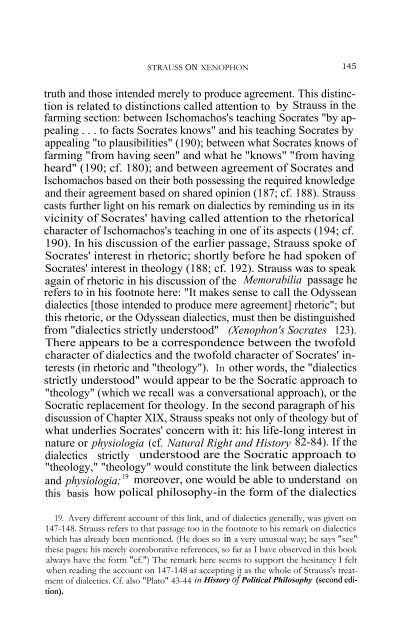Strauss on Xenophon's Socrates Xenophon's Socratic Discourse: An ...
Strauss on Xenophon's Socrates Xenophon's Socratic Discourse: An ...
Strauss on Xenophon's Socrates Xenophon's Socratic Discourse: An ...
You also want an ePaper? Increase the reach of your titles
YUMPU automatically turns print PDFs into web optimized ePapers that Google loves.
STRAUSS ON XENOPHON<br />
truth and those intended merely to produce agreement. This distincti<strong>on</strong><br />
is related to distincti<strong>on</strong>s called attenti<strong>on</strong> to by <str<strong>on</strong>g>Strauss</str<strong>on</strong>g> in the<br />
farming secti<strong>on</strong>: between Ischomachos's teaching <strong>Socrates</strong> "by appealing<br />
. . . to facts <strong>Socrates</strong> knows" and his teaching <strong>Socrates</strong> by<br />
appealing "to plausibilities" (190); between what <strong>Socrates</strong> knows of<br />
farming "from having seen" and what he "knows" "from having<br />
heard" (190; cf. 180); and between agreement of <strong>Socrates</strong> and<br />
Ischomachos based <strong>on</strong> their both possessing the required knowledge<br />
and their agreement based <strong>on</strong> shared opini<strong>on</strong> (187; cf. 188). <str<strong>on</strong>g>Strauss</str<strong>on</strong>g><br />
casts further light <strong>on</strong> his remark <strong>on</strong> dialectics by reminding us in its<br />
vicinity of <strong>Socrates</strong>' having called attenti<strong>on</strong> to the rhetorical<br />
character of Ischomachos's teaching in <strong>on</strong>e of its aspects (194; cf.<br />
190). In his discussi<strong>on</strong> of the earlier passage, <str<strong>on</strong>g>Strauss</str<strong>on</strong>g> spoke of<br />
<strong>Socrates</strong>' interest in rhetoric; shortly before he had spoken of<br />
<strong>Socrates</strong>' interest in theology (188; cf. 192). <str<strong>on</strong>g>Strauss</str<strong>on</strong>g> was to speak<br />
again of rhetoric in his discussi<strong>on</strong> of the Memorabilia passage he<br />
refers to in his footnote here: "It makes sense to call the Odyssean<br />
dialectics [those intended to produce mere agreement] rhetoric"; but<br />
this rhetoric, or the Odyssean dialectics, must then be distinguished<br />
from "dialectics strictly understood" (Xenoph<strong>on</strong>'s <strong>Socrates</strong> 123).<br />
There appears to be a corresp<strong>on</strong>dence between the twofold<br />
character of dialectics and the twofold character of <strong>Socrates</strong>' interests<br />
(in rhetoric and "theology"). In other words, the "dialectics<br />
strictly understood" would appear to be the <strong>Socratic</strong> approach to<br />
"theology" (which we recall was a c<strong>on</strong>versati<strong>on</strong>al approach), or the<br />
<strong>Socratic</strong> replacement for theology. In the sec<strong>on</strong>d paragraph of his<br />
discussi<strong>on</strong> of Chapter XIX, <str<strong>on</strong>g>Strauss</str<strong>on</strong>g> speaks not <strong>on</strong>ly of theology but of<br />
what underlies <strong>Socrates</strong>' c<strong>on</strong>cern with it: his life-l<strong>on</strong>g interest in<br />
nature or physiologia (cf. Natural Right and History 82-84). If the<br />
dialectics strictly understood are the <strong>Socratic</strong> approach to<br />
"theology," "theology" would c<strong>on</strong>stitute the link between dialectics<br />
and physiologia; 19 moreover, <strong>on</strong>e would be able to understand <strong>on</strong><br />
this basis how polical philosophy-in the form of the dialectics<br />
19. Avery different account of this link, and of dialectics generally, was given <strong>on</strong><br />
147-148. <str<strong>on</strong>g>Strauss</str<strong>on</strong>g> refers to that passage too in the footnote to his remark <strong>on</strong> dialectics<br />
which has already been menti<strong>on</strong>ed. (He does so in a very unusual way; he says "see"<br />
these pages: his merely corroborative references, so far as I have observed in this book<br />
always have the form "cf.") The remark here seems to support the hesitancy I felt<br />
when reading the account <strong>on</strong> 147-148 at accepting it as the whole of <str<strong>on</strong>g>Strauss</str<strong>on</strong>g>'s treatment<br />
of dialectics. Cf. also "Plato" 43-44 in History of Political Philosophy (sec<strong>on</strong>d editi<strong>on</strong>).<br />
145

















